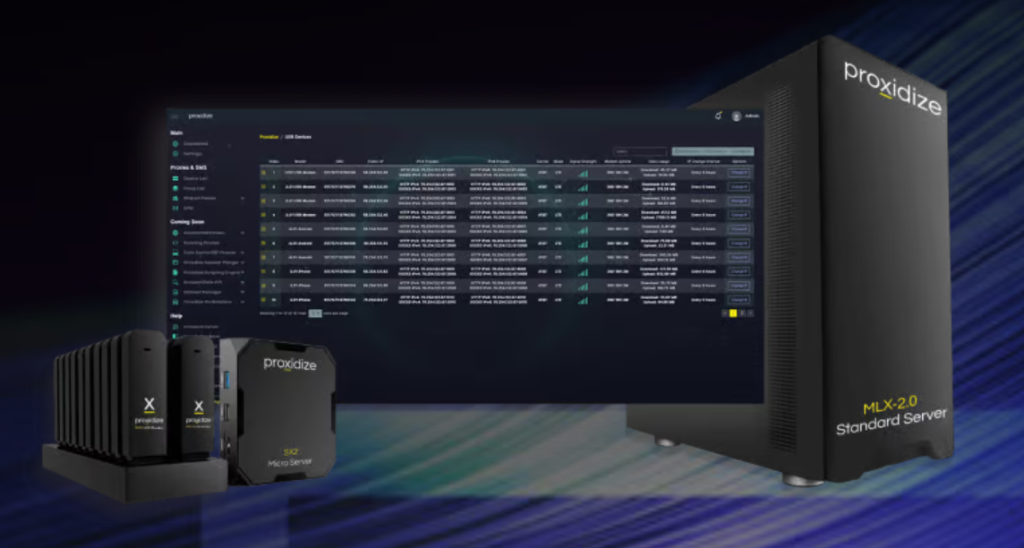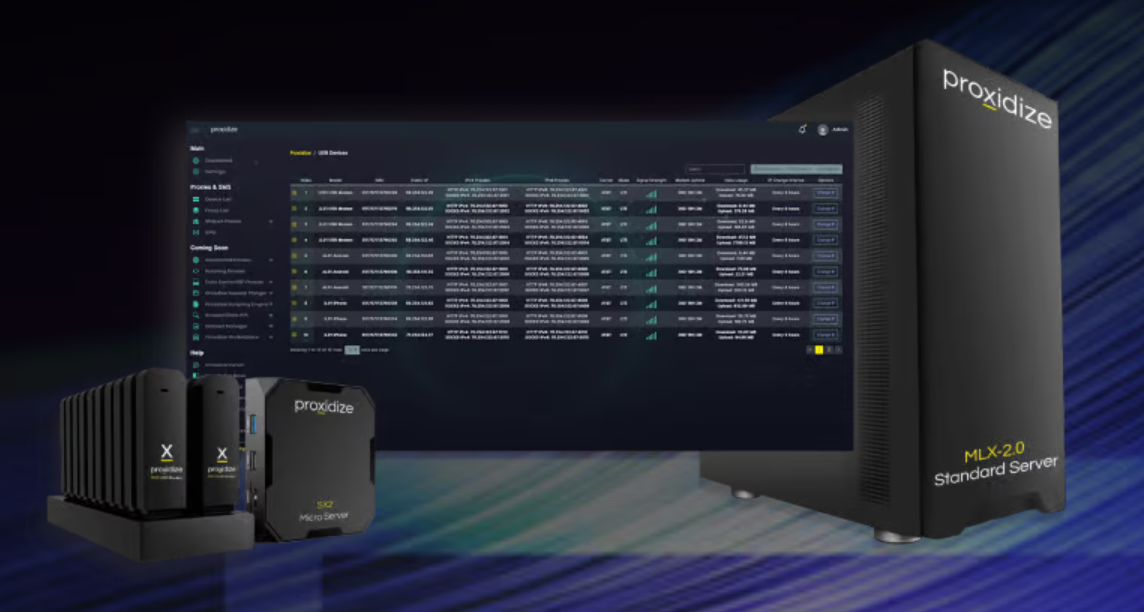
What Is Data Visibility?
May 9, 2024
In the Era of AI: Why Data Centers Still Need Humans
September 10, 2024On this Page…
- What Is a Mobile Proxy Server?
- Benefits of Mobile Proxy Servers
- Challenges in Mobile Proxy Server Deployment
- Hosting Mobile Proxy Servers
- Why Use Colocation Data Centers for Mobile Proxy Servers?
- Conclusion
In today’s digital age, where online privacy and security are essential, mobile proxy servers are a beneficial tool for maintaining anonymity and accessing information unrestricted by geographical boundaries. Unlike traditional proxy servers that rely on fixed data centers, mobile proxy servers utilize the dynamic IP addresses of mobile devices connected to cellular networks, offering added security and lower detectability. We explore the world of mobile proxy servers, from their fundamental operations and benefits to the challenges and specialized hosting solutions and how they can relate to colocation data centers.
What Is a Mobile Proxy Server?
A proxy server is a sort of “middleman” that routes internet traffic between a user’s device and the web, enhancing privacy by masking the user’s real IP address. Mobile proxy servers differ from traditional proxy servers by utilizing the mobile network infrastructure. They route internet traffic through real mobile devices, which often change IP addresses as they connect to different network towers. This mobility ensures that mobile proxies are less likely to be blocked or detected by websites, making them highly reliable and secure.
Common applications of mobile proxy servers include social media management, where they help manage multiple accounts without triggering security flags; ad verification, allowing companies to check how their ads appear in different regions; and market research, enabling the gathering of diverse data without geographical bias. Each of these uses shows the versatility and potential benefits of mobile proxies in digital strategies, where maintaining anonymity and avoiding regional content restrictions are important.

Benefits of Mobile Proxy Servers
Mobile proxy servers provide advantages in security, privacy, and data management. Mobile proxies enhance security by shielding the user’s IP address and increasing privacy. This setup prevents potential attacks from hackers and protects against data breaches, making it harder for malicious actors to exploit personal information or monitor online activities.
These proxies facilitate access to geo-restricted content by providing IP addresses from different locations. This capability allows users to bypass firewalls and access data typically unavailable in their region, which is vital for businesses conducting market research or ad verification.
Mobile proxies offer a stable and less detectable connection to the internet, which is also advantageous for operations like web scraping. They control and compress incoming and outgoing traffic, saving bandwidth and speeding up access to frequently accessed data without facing bans or restrictions.
Organizations leverage mobile proxies to monitor and regulate network traffic. They help log internet usage and can restrict access based on organizational policies, which is particularly useful in managing resource usage and maintaining operational security.
By utilizing mobile proxies, businesses and individuals can gain a reliable tool for enhancing their online security, navigating content restrictions, and improving data collection efficiency while ensuring compliance with privacy standards.
Challenges in Mobile Proxy Server Deployment
Mobile proxy servers have several challenges that include technical, network-related, and legal issues that can affect their effectiveness and compliance. Setting up mobile proxy servers requires a nuanced approach due to their complex nature. These servers are like mediators between clients and the internet, needing robust configuration to handle data traffic properly. This setup includes the integration of software and hardware that must be continuously maintained and updated to ensure smooth operation.
Mobile proxies rely heavily on the stability and speed of cellular networks, which can be inconsistent. Factors such as variable signal strength and network congestion can affect the performance of mobile proxies, leading to potential downtimes and slower response times in data transmission.
The use of mobile proxies should also follow legal standards, which can be complex given their capability to mask user identities and locations. This can raise concerns about privacy violations and unauthorized content access, requiring strict compliance with regulations to avoid legal repercussions. Addressing these challenges is crucial for the effective deployment of mobile proxy servers.
Hosting Mobile Proxy Servers
When setting up mobile proxy servers, choosing the right hosting equipment and software is vital. Providers like Proxidize, Luminati (Bright Data), Oxylabs, and Smartproxy offer solutions that cater to different technical requirements and business needs. These solutions simplify the complex process of establishing mobile proxies by leveraging user-friendly platforms and hardware integration.
Proxidize is known for its straightforward approach, allowing users to create 4G mobile proxies with minimal technical expertise. It utilizes common hardware components such as 4G dongles or modems, a host server (like a PC or Raspberry Pi), a USB hub, and SIM cards with data plans. This supports multiple connections to a single host, enabling the deployment of robust mobile proxy networks. Proxidize’s software manages all networking tasks, making maintenance and scaling straightforward.

Bright Data employs a variety of hosting options to support its extensive IP pools and geolocation capabilities. They utilize on-premises servers as well as cloud-based infrastructure to facilitate proxy hosting. This allows for the deployment of proxies in a scalable manner, accommodating the needs of large-scale operations. Their solutions are designed to integrate seamlessly with various hardware setups, from dedicated servers to potentially more flexible arrangements like modular data centers, ensuring that their high-anonymity proxy solutions are robust and reliable.
Oxylabs emphasizes stability and the capability for extensive data collection, which needs a reliable hosting infrastructure. Oxylabs typically supports a broad range of hardware configurations, including mobile devices and routers, up to complex server setups. They offer solutions for hosting these proxies on dedicated servers or via cloud services, providing flexibility for businesses to manage their data collection activities efficiently across the globe. This versatility in hosting solutions ensures that proxies can be deployed effectively, regardless of the scale or geographical distribution of the operations.
Smartproxy focuses on being cost-effective and user-friendly, catering to individuals to medium-sized businesses. Their proxy services are compatible with a variety of hardware, including standard PCs, virtual machines, and cloud-based servers. Smartproxy’s approach allows users to easily set up and manage their proxies with minimal technical expertise. The support for different hardware setups means that users can choose the most suitable and economical option for their specific needs, making it accessible and practical for those with limited resources or technical knowledge.
When choosing a provider for hosting mobile proxy servers, it’s essential to evaluate the compatibility of their solutions with your existing hardware and infrastructure. Scalability is important, as it allows you to expand your network or adjust settings without significant overhead. Security and reliability are also vital to protect sensitive data and ensure continuous operation in data-heavy environments.
Hosting solutions for mobile proxy servers, like those from Proxidize, Luminati, Oxylabs, and Smartproxy, offer essential tools for effectively managing and scaling mobile proxies. Businesses and individuals should consider their specific needs—including operation scale, geographic coverage, budget, and technical expertise—to select the most suitable solution. By choosing the right hosting equipment and provider, users can enhance their online security, maintain privacy, and ensure efficient digital operations.

Why Use Colocation Data Centers for Mobile Proxy Servers?
Mobile proxy servers utilize IP addresses from mobile devices, which offer dynamic IP management and greater legitimacy, reducing the likelihood of being detected and blocked. This capability contrasts with traditional data center proxies that use static IP addresses, which, while offering fast and stable connections, are more susceptible to detection during tasks like web scraping.
Colocation data centers provide an optimal environment for hosting both mobile and traditional data center proxies. These centers enhance security with robust physical and cybersecurity measures, including advanced surveillance and controlled access. These features are essential for protecting the sophisticated infrastructure necessary for operating mobile proxies and safeguarding sensitive data.
Colocation data centers offer high-speed internet connections and significant bandwidth, crucial for managing heavy data loads with minimal downtime. The scalability and flexibility of these facilities enable easy operational adjustments and scalability, which accommodates the changing needs of mobile proxy services. Hosting in multiple geographic locations also minimizes latency and supports effective geo-targeting with local IP addresses, enhancing global data scraping and digital marketing efforts.
By leveraging the advanced infrastructure and services provided by colocation data centers, businesses can significantly improve the performance, reliability, and security of their mobile proxy servers, making colocation a strategic choice for modern digital operations.
Conclusion
Mobile proxy servers are key to navigating the complexities of internet privacy and regional content restrictions, enabling anonymous operations and access to restricted content. The advantages of using mobile proxies include enhanced security, superior data collection, and geographic versatility. Despite the technical, network-related, and legal challenges involved in deploying these proxies, the use of technologies like Proxidize for straightforward setup and colocation centers for dependable, scalable hosting allows businesses and individuals to effectively utilize mobile proxies. In essence, mobile proxy servers are vital tools for those looking to secure and optimize their online activities efficiently.
